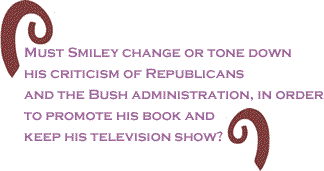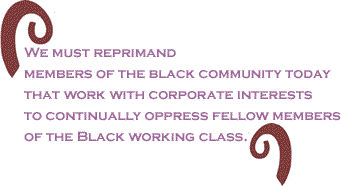
|
|||||||||||||||||||||
 |
|||||||||||||||||||||
 |
|||||||||||||||||||||
 |
|
The popularity of Tavis Smiley’s The Covenant With Black America is remarkable. It has been on the New York Times Book Review since March 26th, and topped the nonfiction paperback bestseller list on April 23rd. With its publication and subsequent intense discussion, it is imperative that we as citizens buy the book, and read it. This must happen, not only so that elected officials can be taken to task based on the book’s content, but also to ensure that the author himself does not forget important aspects of “The Covenant” he espouses. Smiley’s recent commentary on the Tom Joyner Morning Show revealed that he needs reminding of his own document. On May 4th Smiley discussed the idea that 2006, as Republican chairman Ken Mehlman told him, would be “the year of the black Republican.” Why did Tavis seem so enthralled with such a possibility? Is he going to extreme measures to prove his neutrality or bipartisanship? Must he change or tone down his criticism of Republicans and the Bush administration, in order to promote his book and keep his television show? These are very important questions that one must ask in an age when leading figures like Smiley have such a huge influence on the relationships between the black community and large American corporations. One media corporation that has allowed a more progressive, representative voice for African-Americans is National Public Radio. NPR is a leader among news networks in allowing blacks more autonomy in news shows with a much broader listening demographic. It gave Tavis Smiley his very first nationally syndicated news radio program in 2001, and after his withdrawal in December of 2004 – claiming that NPR was not doing enough outreach to the African-American community – came Ed Gordon. NPR granted Gordon his own show, News and Notes with Ed Gordon in January of 2005. He asks incisive questions and is leaving an indelible mark on black American journalism with the very lively and informed roundtable discussions his show features every weekday on NPR. Most notable, in my view, was his interview with Andrew Young (March 2, 2006), a conversation about the sometimes problematic roles that corporations play in African American politics.
However, the involvement of corporations like Wal-Mart in Tavis Smiley’s own PBS show is equally problematic. In Robert Greenwald’s 2005 film Wal-Mart: The High Cost of Low Prices, Wal-Mart employee Donna Payton stated that “I can’t afford to put my children on the Wal-Mart insurance because it's too expensive. They’re a billion dollar corporation so I don’t see why they cannot offer a better medical package for their associates, so that we can afford to get our families on insurance.” Another Wal-Mart employee in the film, identified as Alicia Sylvia, said that “there’s no way I can afford to have $75 taken out of each check just for medical.” Isn’t the denial of living wages and decent health benefits against the principles Tavis Smiley and his show stand for? Or, should Tavis Smiley’s show have an opinion or principle on the matter of Wal-Mart employees? If he is as concerned about The Covenant With Black America as he says he is, these are important questions that Tavis Smiley should answer. If Smiley really wants to “address the primary concerns of African-Americans today” as he claims to in his book’s Introduction, he must address the classist and ultimately racist policies of Wal-Mart against its own employees, most importantly, its denial of a living wage and affordable healthcare.
Although Tavis can argue that his book is entirely independent of his PBS show, Wal-Mart is one of the major underwriters of the program, which affords him nationwide visibility. Therefore, Wal-Mart plays a crucial role in sustaining Smiley’s popularity and book sales. I maintain that it is in Tavis’ long term interest to address the “primary concerns of African-Americans today” by publicly addressing these issues, including – and especially – as they relate to his sponsors. Ed Gordon did the right thing in his NPR interview with Andrew Young, who is now chairman of Working Families for Wal-Mart. As stated in Bruce Dixon’s BlackCommentator.com article “Shameless Son,” Young has been quite a significant pawn for corporate interests, to the detriment of the black community. Moreover, with Ed Gordon, Young defended Wal-Mart’s practices in preventing a living wage for many working-class American families:
Is Wal-Mart, along with other ruthless multinational corporations, going to be the only means by which concerned African-Americans such as Tavis can actually address the endemic starvation in Africa? Gordon’s questions and Young’s replies raise critical questions on how African-Americans will be practically able to help fellow Africans across the Atlantic, who suffer a more pernicious, protracted, disinterested racism. These questions also involve an insidious kind of racism that sees a group of people more as commodities than as actual human beings. Robert Allen describes a sort of “commodification” of leaders who are African-American in order to advance the profit margin of these corporations. In Black Awakening in Capitalist America, Allen writes that “putting Black Power into business” – which is what Wal-Mart is doing through Andrew Young – is creating “a stabilizing Black buffer class that will make possible indirect white control (or neocolonial administration) of the ghettos.” Allen further states that “this is the class that will have the closest contact with corporate America and which is to act as a conduit for its wishes.”
Clearly Andrew Young has become a conduit for the wishes of Wal-Mart. His willingness to be a hired hand – exposed by Ed Gordon – proves this, along with his refusal to be an important watchdog who could help working class employees and their children attain decent health coverage. The conflict that BC’s Bruce Dixon writes about between Andrew Young and Atlanta is crucial because it highlights the black community resisting “the neocolonial administration of the ghettos.” Blacks will not simply relinquish their right to decent healthcare in a country whose opulence shames its refusal to engage a national healthcare system. Dick Roberts, in a seminal 1970 ISR article entitled, “The Fraud of Black Capitalism,” writes that “there is no evidence that the government agencies and private foundations of the American ruling class hope to improve the income level of whole layers of the Black population or anything close to that. Their aim is quite different. They hope to buy off a few individuals – and thereby fool the whole population. This is the essence of capitalist tokenism. It is imperative that the tactics and strategy of revolutionaries be based on a clear recognition and understanding of this two-faced operation.” Although it is clear that many in the traditional civil rights establishment have been bought off such as the Congress of Racial Equality’s (CORE) Roy Innis, whom Roberts wrote was paid off by the Ford Foundation to be involved in Black community projects that are “incapable of fruition,” we must reprimand members of the black community today that work with corporate interests to continually oppress fellow members of the Black working class. In White Money/Black Power, Noliwe Rooks writes about the dangerous strings that the Ford Foundation attached to funding Black Studies programs at American colleges and universities:
This very narrow-minded purpose that obscures Black studies as an academic discipline partly explains the dearth of interest and the declining enrollment of Black Studies majors. In the article “Some Like It Hot,” by Chris Mooney in the May/June 2005 issue of Mother Jones magazine, CORE was identified as a major recipient of ExxonMobil funds to propagate the idea that Global Warming does not exist. The buying of CORE was most evident when CORE made of all people, Karl Rove, their Martin Luther King Day civil rights honoree. It is our duty as citizens to be the watchdog that Andrew Young refuses to be. Indeed, he is someone to be watched. As quick as we are to slap the label of “sellout,” is as quick as we must be to avoid becoming one ourselves. We must be vigilant watchdogs for the interests of our own community. We must also be vigilant against organizations that have completely “sold out” to corporate interests. Being vigilant means questioning what you hear and challenging our popular leaders at even the hint of treachery. In the aforementioned Tom Joyner show commentary, Tavis Smiley seemed to buy into the notion that somehow 2006 is going to be "the year of the Black Republican." This is hogwash. The bitter truth is that the Republicans have refused to change their policy priorities to try and meet the concerns of most African-Americans who still vote overwhelmingly Democrat. Just because Republicans have put forward candidates like J. Kenneth Blackwell for governor of Ohio, Michael Steele for U.S. Senator from Maryland, Keith Butler for U.S. Senator from Michigan, and Lynn Swann for governor of Pennsylvania, does not mean that this is the year for Blacks to vote Republican. Republicans have never earned the votes of African-Americans, and token leadership cannot change that. What made Tavis's commentary most appalling was his statement, "I like Kenneth Blackwell, but..." There is no "but." This was a red flag that triggered my watchdog duty. I was thinking: How can you "like" a thief? How can you "like" the man who played the role in Ohio in 2004 that Katherine Harris played in Florida in 2000? How can you "like" the man who issued confusing registration directives weeks before the 2004 election in order to successfully confuse the voting process? How can you "like" the man who stopped provisional ballots to disenfranchise mainly African-American voters? How can you "like" the man who had voting machines moved from Democratic districts where they were needed, to Republican districts where they were never used? Like the rest of the Republican party that funds these antics, Blackwell is not to be liked, but should be punished by the African American electorate. J. Kenneth Blackwell sought to disenfranchise African-American voters of his own state. Tavis Smiley must be more faithful to his own “Covenant with Black America” by taking Blackwell to task. He needs to know how to apply more closely what Wade Henderson said on pages 135 to 139 of Smiley’s own book: "eliminate all voter suppression and intimidation." Clearly, Smiley’s "liking" Kenneth Blackwell does not help him engage in this necessary process. I argue that it was perhaps Wal-Mart’s wish to validate
Blackwell’s candidacy for Ohio governor, rather than Tavis Smiley’s
wish. American media force what is called a “conservative”
point of view down peoples’ throats – including the throats of
Tavis Smiley’s audience. This
is why it is essential that readers of Black Commentator.com be
watchdogs and call Andrew Young out on his being a sell out and
contact Tavis Smiley by phone or e-mail when he seems to be “slipping”
in his ideology. |
|
| Home | |
Your comments are always welcome. Visit the Contact Us page to send e-Mail or Feedback or Click here to send e-Mail to [email protected] e-Mail re-print notice
If you send us an e-Mail message we may publish all or part of it, unless you tell us it is not for publication. You may also request that we withhold your name. Thank you very much for your readership. |
|
| May 18, 2006 Issue 184 |
||||||||||||||
|
||||||||||||||
|
||||||||||||||
| Printer Friendly Version in resizeable plain text format | ||||||||||||||
 |
||||||||||||||
 |
||||||||||||||
 |
||||||||||||||
 |
||||||||||||||
| |
||||||||||||||
| |
||||||||||||||






























